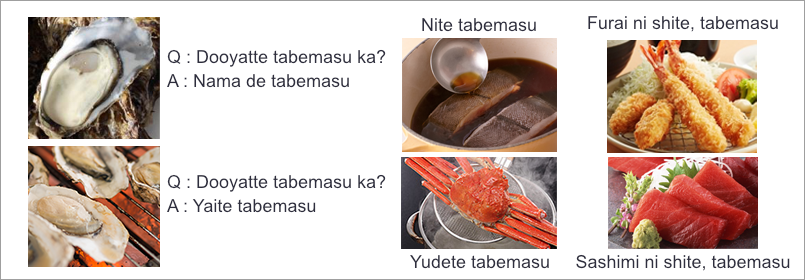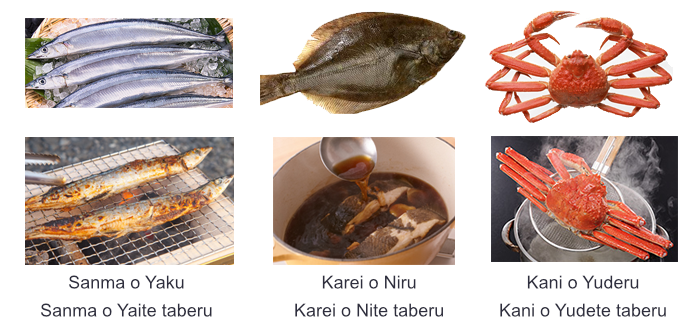
Minasan no kuni de wa dooyatte Kaki o tabemasu ka?
Nama de tabemasu ka, yaite tabemasu ka?
Nihon de wa Kaki o Furai ni shite, tabemasu.
Nihon ryoori de "Sakana" to ieba, Sashimi desu.
Nihon-jin wa sakana ya kai o nama de tabemasu.
Demo, nama bakari tabete iru wake janai desu.
Sakana ya kai o yaite tabetari, nite tabetari, shimasu.
Watashi wa Sanma o yaite tabemasu.
Watashi wa Karei o nite tabemasu.

Kani wa Sashimi ni shite tabetari, yudete tabetari, shimasu.
Watashi wa Sashimi yori yudeta hoo ga suki desu.
Desukara, watashi wa Kani o yudete tabemasu.
Tabe-kata wa kuni ni yotte chigau shi, hito ni yotte chigaimasu.
Practice Each Sentence
 |
1. | Minasan no kuni de wa dooyatte Kaki o tabemasu ka? |
minasan everyone, you, kuni country, -de place marker; in, at
dooyatte tabemasu ka? how do you eat it?
dooyatte how, Kaki oyster, tabemasu to eat
 |
2. | Nama de tabemasu ka, yaite tabemasu ka? |
nama de tabemasu eat something raw
nama raw, uncooked, -de means or method marker; by, with, in
yaite te form of yakimasu; grill, broil, roast, bake, toast
-ka or, -ka? question marker
[noun A desu] ka, [noun B desu] ka?
[verb A-masu] ka, [verb B-masu] ka?
 |
3. | Nihon de wa Kaki o Furai ni shite, tabemasu. |
Nihon de in Japan, -de place marker; in, at, Kaki oyster
furai deep-fry, deep-fried food, -ni shimasu make A to B, change A to B
 |
4. | Nihon ryoori de "Sakana" to ieba, Sashimi desu. |
ryoori [sv] cooking, food, dish, cuisine, -de indicating a situation, scene, event, issue, field, etc.
sakana fish, -to ieba speaking of, when it comes to, -to quotation marker; ".....", that
ieba ba conditional form of iimasu; if one says, Sashimi sliced raw fish
 |
5. | Nihon-jin wa sakana ya kai o nama de tabemasu. |
sakana fish, kai shellfish, -ya A, B, etc
nama raw, uncooked, -de means or method marker; by, with, in, tabemasu to eat
 |
6. | Demo, nama bakari tabete iru wake janai desu. |
nama raw, uncooked, -bakari (noun +) only, all
tabete te form of tabemasu; eat, -te iru expressing progressive, state or habitual action
-wake janai it doesn't mean that
 |
7. | Sakana ya kai o yaite tabetari, nite tabetari, shimasu. |
sakana fish, kai shellfish, -ya A, B, etc
yaite te form of yakimasu; grill, broil, roast, bake, toast
nite te form of nimasu; to boil (with soy sauce, etc.)
tabeta ta form of tabemasu, -tari, -tari, shimasu do this and that (and so on)
 |
8. | Watashi wa Sanma o yaite tabemasu. |
Sanma Pacific saury, yaite te form of yakimasu / yaku; grill, broil, roast, bake, toast
 |
9. | Watashi wa Karei o nite tabemasu. |
Karei Pleuronectidae, flatfish, nite te form of nimasu / niru; to boil (with soy sauce, etc.)
 |
10. | Kani wa Sashimi ni shite tabetari, yudete tabetari, shimasu. |
Kani crab, Sashimi sliced raw fish
-ni shimasu make A to B, change A to B, shite te form of shimasu
yudete te form of yudemasu / yuderu; boil (without sauce)
-tari, -tari, shimasu do this and that (and so on)
 |
11. | Watashi wa Sashimi yori yudeta hoo ga suki desu. |
Sashimi sliced raw fish, yudeta ta form of yudemasu / yuderu; boil (without sauce)
[A] yori, [B] no hoo ga suki I like [B] more than [A], I prefer [B] to [A], suki [na] like, prefer
When [A] is a verb phrase, the verb should be the root form (or nai form in the negative).
When [B] is a verb phrase, the verb should be the ta form (or nai form in the negative).
 |
12. | Desukara, watashi wa Kani o yudete tabemasu. |
desukara therefore, Kani crab
yudete te form of yudemasu; boil (without sauce)
 |
13. | Tabe-kata wa kuni ni yotte chigau shi, hito ni yotte chigaimasu. |
tabe-kata how to eat, cooking style, -kata (stem +) how to do, way of
kuni country, hito person, people
-ni yotte chigaimasu be different depending on, differ depending on, it depends on
-ni yotte according to, depending on, chigau root form of chigaimasu; be wrong / be different
-shi, (-shi) listing two or more factors; and, also
Vocabulary & Pick Up
Functional patterns used in the sentences (Chapter numbers are from Building Up Conversation)
yaite tabemasu / nite tabemasu / yudete tabemasu / furai ni shite tabemasu
te form -te / -kute / -de:used as a conjunction "and" to indicate a means or method; by, with, in, etc.
Level 2 Chapter 6
nama bakari
noun + bakari / verb te form + bakari:only, always, keep doing
Level 3 Chapter 17
yaite tabetari, nite tabetari, shimasu
verb ta form + -tari, -tari, shimasu:telling some actions; do this and that (and so on)
Level 2 Chapter 7
sashimi yori, yudeta hoo ga suki
-yori, -no hoo ga:comparison - more than / less than
Level 1 Chapter 13
tabe-kata wa kuni ni yotte shigau shi,
verb stem + kata:how to do
Level 3 Chapter 15
kuni ni yotte shigau shi, hito ni yotte chigaimasu
-ni yotte chigaimasu:differ depending on, It depends on
Supplementary : Common Phrases & Sentence Patterns File No. 045a
kuni ni yotte shigau shi, hito ni yotte chigaimasu
-shi, (-shi,):listing two or more factors; and, also
Level 3 Chapter 9










